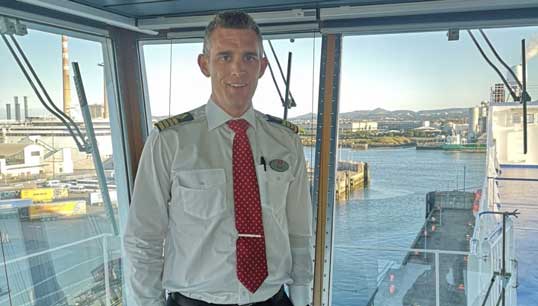- Topics
- Campaigning
- Careers
- Colleges
- Community
- Education and training
- Environment
- Equality
- Federation
- General secretary message
- Government
- Health and safety
- History
- Industrial
- International
- Law
- Members at work
- Nautilus news
- Nautilus partnerships
- Netherlands
- Open days
- Opinion
- Organising
- Podcasts from Nautilus
- Sponsored content
- Switzerland
- Technology
- Ukraine
- United Kingdom
- Welfare

Chief officer and master Fraser Matthew can be found plying the waves on large passenger ships on the Irish Sea and around the west of Scotland
What is a typical day in your job?
Typically, I will work either a 12-hour night shift or day shift during which I am in command of the ship. During each shift the ferry will complete two to three crossings of the Irish Sea between either Dublin and Holyhead or Belfast and Loch Ryan. As master, I will conduct the pilotage and berthing/un-berthing manoeuvres on the bridge in each port.
No shift is ever the same, filled with a huge range of tasks and duties required to operate and manage a large passenger ship. There is always a long string of e-mails in the inbox from ashore or other onboard departments. Surveys and audits are also there to keep us on our toes, as is the training exercises and drills that we hold to ensure all our crew are ready to face any emergency.
Each day is filled with new situations, problems and weather conditions all of which makes it a new adventure!
Why did you choose a career at sea?
I grew up on the coast of the River Forth and can always remember as a child looking out at the ships wondering 'where they have been' and 'where are they going'. A life at sea always interested me since the view from your office always changed, and I could never imagine myself working a nine to five job and commuting every day.
Since leaving school and starting my cadetship, I still feel the job has such variety and is constantly changing and evolving.
Tell us some of your career highlights so far – and challenges
The career highlight for me is definitely taking my first command. It was the most surreal moment introducing myself as captain over the Public Address to 1,000 passengers in the height of the summer. It was similar to driving a car for the first time after passing your test, up to that point you always had someone checking over your actions and now you realise it's all on you! Although very quickly it becomes second nature and now it's just like driving a car, even though its 215m long.
Working as part of an international onboard team has always been a highlight for me. The seafarers' ability to work together in harmony no matter of background, nationality, race or religion is an inspiring story to tell. We all work together to ensure the ships make it safely across the world and enable international trade to flow.
Time management is definitely a challenge, with ferries you have to constantly fit everything in around the sailing schedule. The majority of pre-departure preparations are precisely timed around the loading operations to ensure we sail on time, doors take six minutes to close, engines eight minutes to start, moorings two minutes to let go. I do find myself looking at my watch a lot before sailing especially if there are delays.
What are the best things about your job?
I love the challenges, every day is different and there is always something learn or learn how to do differently. The weather is something to be respectful of, and in the winter, it makes your day even more challenging and rewarding.
The intensity of the work and long hours are well balanced with leave. I really think we are lucky as seafarers since we have the luxury of complete job separation. When I'm home on leave I don't have to worry about what is going on at work, and I'm free to do so much more than what I could squeeze into a weekend.
Would you recommend seafaring as a career?
Absolutely! A career at sea allows you to learn a craft that has been around for hundreds of years and still provides an essential service to the transportation of goods. If you can manage the long periods away from home you are rewarded with building unique friendships with all nationalities, and the experience of travelling the world.
Tell us one thing that people may not know about your job?
Certification. Ships and crew have to carry a crazy number of certificates. All with different validities, expiry dates and survey requirements. It is a full-on job to check everything remains valid and all crew keep their own certificates in date.
Become a Nautilus Champion
Nautilus is looking for members who can volunteer their time for the Union's campaigns, media outreach and recruitment initiatives. You can help breathe life into these programmes, bring a more diverse and representative voice to the Union, and ultimately help us create greater awareness of the maritime industry among the public.
Tags
